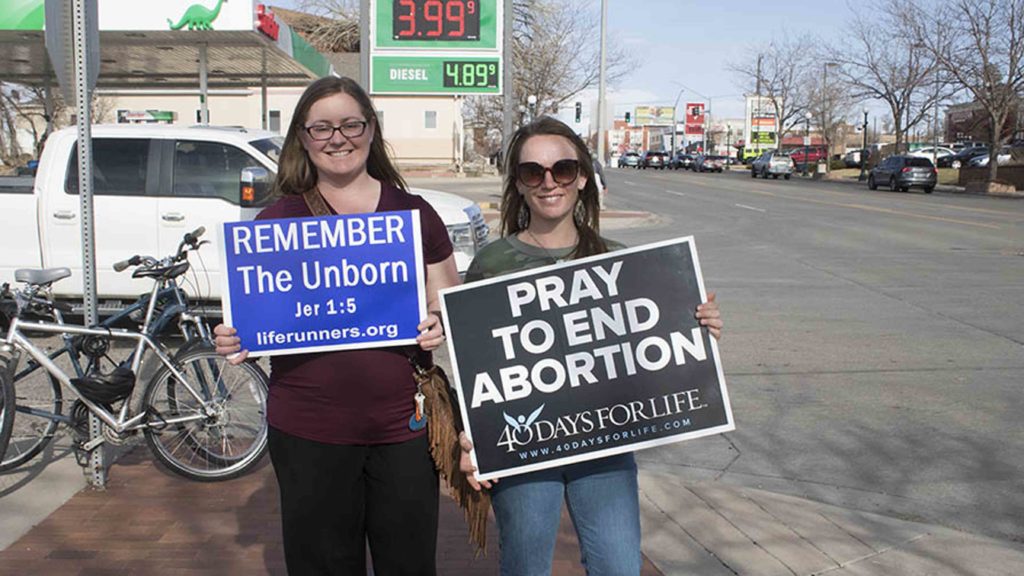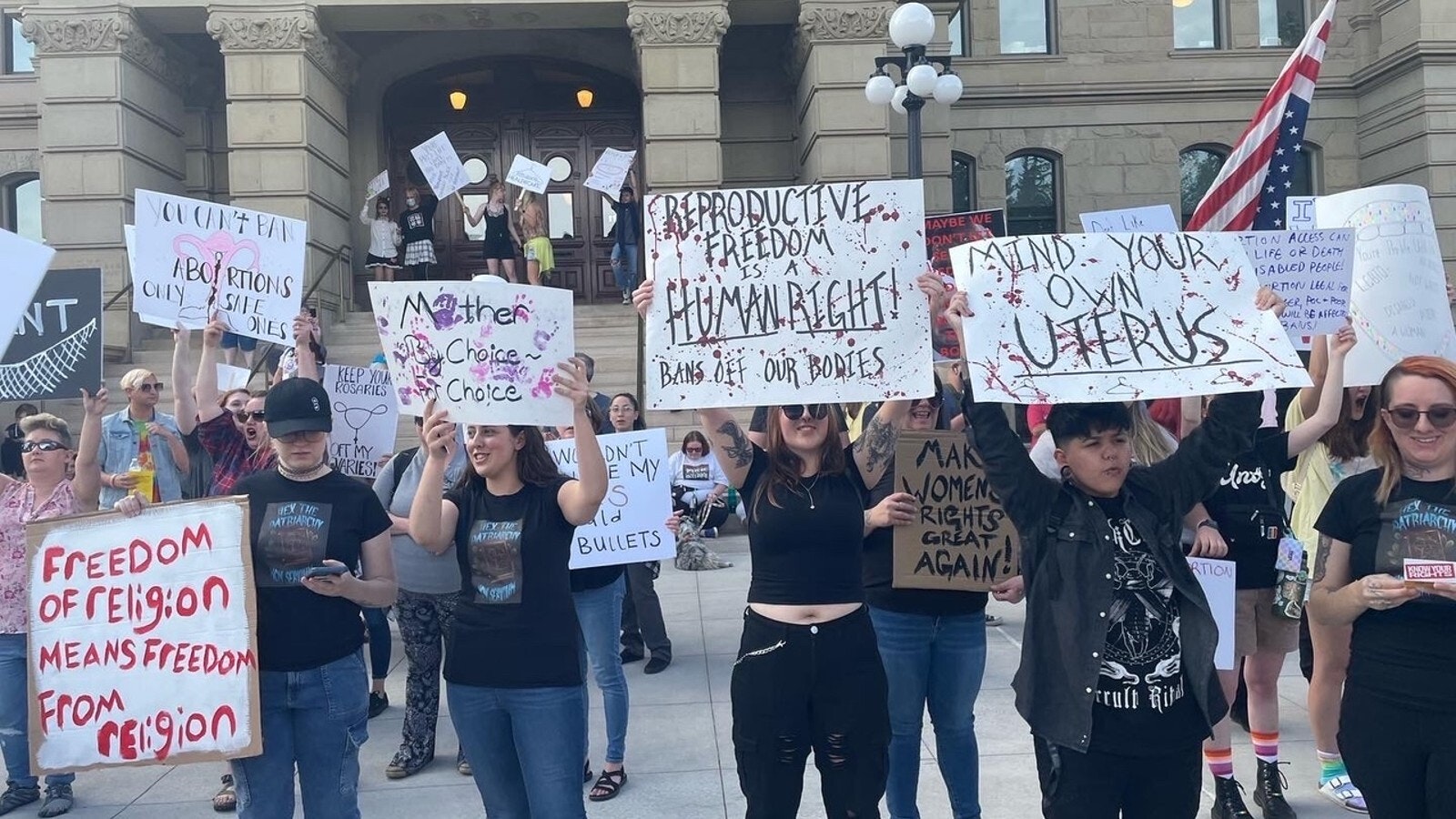Wyoming’s courts system will decide Wednesday again whether to block the state’s newest abortion ban over individual rights concerns during a legal challenge to the ban’s constitutionality.
Teton County District Court Judge Melissa Owens has scheduled a 1 p.m. emergency hearing to consider a pro-choice coalition’s request for a temporary restraining order, or block, of the recently passed Life Is A Human Right Act, which bans nearly all abortions.
Gov. Mark Gordon let the act become law Saturday after declining to sign it. Gordon said the law would get bound up in the courts, and said he’d prefer that the Legislature advance a ballot initiative to ban abortion in the Constitution instead of passing another law.
House Bill 152 is a more-specific rewriting of the 2022 “trigger ban” that also would have banned nearly all abortions once the U.S. Supreme Court overturned Roe vs. Wade. After the high court did so, Owens blocked the ban almost as soon as it became effective.
Owens at the time said the trigger ban didn’t account for doctors’ “reasonable medial judgment” in life-threatening pregnancy situations where abortions are both legal and required to save a mother’s life.
She later voiced a strong inclination toward interpreting abortion as “health care” under the Wyoming Constitution, which promises state residents health care autonomy.
The new state abortion ban treats abortions as a felony punishable by up to five years in prison and $20,000 in fines, but has exceptions for multiple health conditions, as well as rape and incest exceptions. It requires women to show a law enforcement report pertaining to the rape or incest against them to obtain an abortion on those grounds.

‘Ethical And Sound’
The same plaintiffs who sued Wyoming over the trigger ban filed a lawsuit Friday over the Life Is A Human Right Act. They are asking Owens to block the law and ultimately declare it unconstitutional.
Those plaintiffs are:
- Danielle Johnson, who had a baby in November and would like abortion as an option if she chooses to have more children. Johnson argues that abortion is “evidence-based” and “ethical and sound” health care.
- Kathleen Dow, a University of Wyoming College of Law graduate and a practicing conservative Jew. Dow says her faith requires her to consider abortion as an available “heath care alternative” if future pregnancy conditions threaten her physical or emotional well-being. Dow also asserts that according to her own “sincerely held religious beliefs,” life begins at birth and “an unborn fetus is not a person.”
- Dr. Gioviannina Anthony is an obstetrician/gynecologist who performs abortions in Jackson and is afraid that a “pregnancy loss” under her care “could lead to felony charges and incarceration as well as collateral professional consequences.” She alleges the law’s language is too “arbitrary and vague” to allow her to respond to crises.
- Dr. Rene Hinkle, an obstetrician/gynecologist in Cheyenne, does not perform elective abortions but does treat miscarriages and ectopic pregnancies, the lawsuit says. She alleges that the law’s provision allowing abortions in the cases of fetal anomalies that would kill a baby within hours of its birth is not liberal enough, because there are fetal anomalies that allow a baby to survive several days past birth. Hinkle asserts that babies with Trisomy 18, Trisomy 13 and skeletal dysplasia fall under this category, and she will “not be able to perform abortions when these fetal anomalies are diagnosed.”
- Chelsea’s Fund is a nonprofit group that helps women obtain abortions. The group fears that having to send women out of state for legal abortions will “overwhelm” it.
- Circle of Hope is trying to open the Wellspring Health Access abortion clinic in Casper in the coming weeks. The clinic also intends to offer other types of care and counseling, sex education and “gender-affirming care” for transgender people. It hopes to serve about 1,100 people a year, according to the lawsuit, but has been delayed from opening because an unknown arsonist burned the clinic last year.
‘Not The Right Time’
The coalition says it is also pleading its case on behalf of all Wyomingites, saying an abortion ban would “force Wyomingites to continue a pregnancy against their will.” It alleges that women will be “forced to forego educational opportunities, face decreased opportunities to fulfill their economic potential, and be more likely to experience economic insecurity and raise their children in poverty.”
The lawsuit continues, arguing that “women may also decide that it is not the right time for them to have a child or to add another child to their families.”
‘A Rapist’s Best Friend’
The plaintiffs claim that for women who have been raped or suffered incest, the law’s requirement that they produce a law enforcement report to obtain an abortion on those grounds is a “harassing procedural hurdle.”
The bill’s sponsor, Rep. Rachel Rodriguez-Williams, R-Cody, has countered this. She told Cowboy State Daily last year that abortion is “a rapist’s best friend” because it allows rapists to hide their acts from law enforcement and avoid prosecution.
Christian Viewpoint
The lawsuit claims that the Life Is A Human Right Act imposes a Christian law upon all Wyoming residents.
“This viewpoint (that life begins at conception) is distinct to certain Christian denominations,” the suit says, “and is not shared by other religious denominations, including many Christians, Jews and Muslims, among others.”
There is variation among Jewish sects, but conservative and liberal Jews especially have interpretive case law holding a mother’s life as more valuable than an unborn baby’s life. In some interpretations, the mother’s mental health issues are considered as well as her physical health when contemplating an abortion.
Privacy
Unlike last year’s lawsuit challenging the trigger ban, the new suit doesn’t assert that Wyomingites have a state-given “right to privacy.”.
When the plaintiffs last year insisted that Wyomingites have a state right to privacy that protects abortion access, Wyoming’s Attorney General deputy accused the plaintiffs of conjuring that right.
A group of lawmakers during the recent lawmaking session tried to advance a ballot initiative bill that would add “the right of individual privacy” to the state Constitution, if voters approved it. But the state Senate did not consider the bill.
The bill’s sponsors and co-sponsors were a bipartisan combination consisting of:
- Sen. Chris Rothfuss, D-Laramie
- Sen. Eric Barlow, R-Gillette
- Sen. Cale Case, R-Lander
- Rep. Ocean Andrew, R-Laramie
- Rep. Karlee Provenza, D-Laramie
- Rep. Cyrus Western, R-Big Horn
- Rep. Mike Yin, D-Jackson
Footnote
As a footnote, the plaintiffs say their references to “women” do not apply only to women but to any “people who are or may become pregnant” including “transgender men, agender and gender-diverse individuals (who) may also become pregnant and seek abortion services.”





